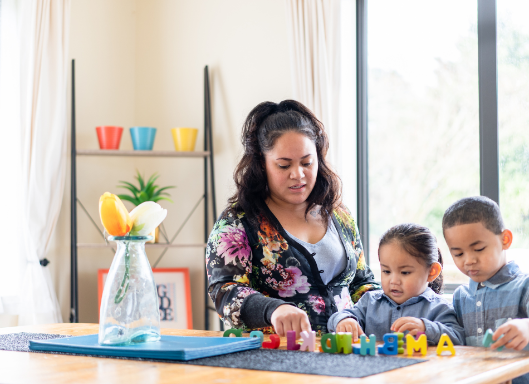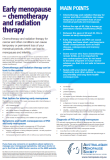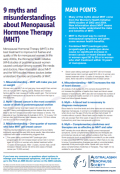If you're a frequent visitor to Healthify, why not share our site with a friend? Don't forget you can also browse Healthify without using your phone data.
Early menopause
Key points about early menopause
- Menopause happens when your menstrual periods stop, this is usually between 45 and 55 years of age.
- Early menopause happens when your menstrual periods stop when you're 40–45 years of age.
- Menopause before the age of 40 years is referred to as premature menopause or primary ovarian insufficiency (POI).
- It can happen naturally for some women, or as a side effect of a medical condition or some treatments.
- If you're under 45 years and have noticed your periods becoming infrequent or stopping altogether, you should talk to your healthcare provider.

Menopause means the end of a person's menstrual periods. Perimenopause is the stage leading up to menopause when your body is reaching the end of its reproductive years. It can take several years and during this time your ovaries are not releasing eggs regularly (ovulating) and your hormone levels are beginning to fluctuate (go up and down). You are said to have gone through menopause when you haven't had a period for 12 months in a row, but other symptoms of menopause can go on longer. Read more about menopause.
For most people, menopause starts between the ages of 45 and 55 years. The average in Aotearoa New Zealand is 52 years. However, for some people menopause can occur earlier.
- Menopause before the age of 45 is called early menopause. This affects about 5 in 100 women (5%).
- Menopause before the age of 40 is called premature menopause (also called premature ovarian insufficiency or POI).
Video: Early and premature menopause
This video provides an explanation of early menopause and hormone therapy. It may take a few moments to load.
The main indicator of early menopause is your periods becoming infrequent or irregular, or they stop altogether, without any other reason (eg, pregnancy or using contraception).
You may experience other symptoms of menopause such as:
- hot flushes
- night sweats
- vaginal dryness and discomfort during sex
- difficulty sleeping
- low mood or anxiety
- reduced sex drive (libido)
- problems with memory and concentration.
Read more about the signs of menopause. If you're still having periods and are not having symptoms of menopause, there isn't usually any value in testing your hormone levels as these results can be misleading.
For most people, the cause is unknown. In some cases, the condition can be associated with:
-
- genetic conditions – if you have Turner syndrome or are a carrier of Fragile X syndrome.
- autoimmune conditions such as autoimmune thyroid disease, type 1 diabetes, pernicious anaemia, myasthaenia gravis and connective tissue disorders
- rare metabolic conditions such as galactosaemia
- infections such as mumps
- surgery involving your ovaries, chemotherapy and radiation therapy.
There are some things that can increase your risk of early menopause, for example:
-
- family history of early menopause
- never having given birth
- menstrual periods (menarche) starting before 11 years of age
- hysterectomy
- HIV infection
- smoking
- low body weight
- previous surgery to your ovaries.
Your healthcare provider will check there aren’t any other reasons why you might be having irregular, or no, periods and any other symptoms. They should be able to make a diagnosis of early menopause based on your symptoms, your family history, and blood tests to check your hormone levels. You may be referred to a specialist.
Criteria for a diagnosis of premature menopause include:
- more than 4–6 months without a menstrual period (with no other explanation)
- follicle stimulating hormone (FSH) levels in the menopausal range (>40 IU/L) on 2 occasions at least 4 to 6 weeks apart.
Oestradiol levels are usually tested as well to confirm the FSH results.
Note: A diagnosis of early or premature menopause can be distressing and you will need to plan for your future health. It helps to have a healthcare provider you can talk to and feel comfortable with, as you will need follow-up support and management. See the support section below.
There’s no way to reverse menopause as it occurs because there are no more eggs in your ovaries and your hormone levels drop. So there’s no treatment as such for early menopause, but there are medicines available to replace the hormones your body is no longer making. These medicines can decrease your risk of developing conditions you're more likely to develop once you have reached menopause. These include osteoporosis, stroke and heart attack. There may also be lifestyle changes you can make to lower your risk. Talk to your healthcare provider about what you should do to stay healthy.
Hormone replacement therapy
If you experience menopause early you may be offered hormone replacement therapy (HRT) to replace the hormones that would usually be produced by the ovaries.
Note: When it is given to women over 50 years of age, hormone therapy is called menopausal hormone therapy (MHT). For women who are under 50, similar hormone therapy can be called hormone replacement therapy (HRT). This is because the treatment is replacing hormones that would be produced if you were still having periods.
It's generally recommended that HRT is continued until at least the age of natural menopause (around 51 on average), to give you some protection from osteoporosis and other conditions that can develop after menopause. It can also help you manage menopausal symptoms. HRT options include:
- oestrogen tablets, patches, gels and topical vaginal treatments – if you've had a hysterectomy
- oestrogen plus progesterone – if you haven't had a hysterectomy
- combined oral contraceptive pill as a replacement hormone – if you have no significant risk factors (such as a clotting tendency, past clots or if you are a current smoker).
If you have had certain types of cancer, (eg, some types of breast cancer) you may not be able to have hormonal treatment. If this is the case, your healthcare provider will talk to you about other treatment options and lifestyle changes you can make to help protect your health.
Lifestyle changes
As early menopause can affect your bone density, it can increase your risk of developing osteoporosis and your risk of breaking a bone if you have a fall. A bone density scan, known as DEXA scan, may be done to check your bone density and see if any treatment is necessary. Read more about diagnosing and treating osteoporosis. Whether your current bone density is good or not, it's still important for everyone to have plenty of calcium, vitamin D (from safe time in sunlight, food or a supplement) and keep doing weight-bearing exercise to keep your bones strong. It’s especially import as we age, and even more so if you have had early menopause.
Other lifestyle changes (eg, eating a balanced diet with fruits and vegetables as well as quitting smoking) can help to decrease your risk of heart attack and stroke. Talk to your healthcare provider about what you can do, or follow the links in the ‘learn more’ section to read about these conditions and healthy eating and exercise.
Going through menopause early can be difficult and upsetting. It might come as a shock, especially if you were planning to have children. If you think you might be perimenopausal, and want to have a child, talk to your healthcare provider as soon as possible. There may be things a fertility specialist can do to increase your chances of having a baby.
Note that even though you have stopped having periods, you may still be fertile for a while. If you don’t want to be pregnant, it’s advisable to keep using contraception for at least a year after menopause if you are 50 years of age or older, and for 2 years if you're under 50.
Menopause at any time may feel like a loss, or at least an age-related transition in your life and when it’s experienced early it can have a greater impact. You may feel angry or sad, and you may feel that it’s unfair that it’s happened before you expected it. Even if you didn’t think you wanted children you may grieve the loss of that possibility, which is a very normal response.
It can be helpful to have understanding people to talk – like your partner, whānau and friends as well as your healthcare team. You might like to think about some counselling if you're finding it difficult to understand and come to terms with your situation.
In addition to the support of family, friends and a healthcare team, some women find it useful to talk to other women in a similar situation, for example the NZ Early Menopause Support group(external link).
New Zealand Early Menopause (NZEM)(external link)
Early menopause – chemotherapy and radiation therapy(external link) Australasian Menopause Society
Early menopause and cancer(external link) Cancer Society
Early menopause.com(external link)
References
- Premature ovarian insufficiency in general practice: Meeting the needs of women(external link) Australian Family Physician, 2017
- Spontaneous premature ovarian insufficiency(external link) Australasian Menopause Society
- Champ L. Is the menopause a grieving process?(external link) Welldoing, UK, 2021
- Diagnosing and managing primary ovarian insufficiency(external link) BPAC, NZ, 2019
Brochures

Early menopause – chemotherapy and radiation therapy
Australasian Menopause Society

9 myths and misunderstandings about Menopausal Hormone Therapy (MHT)
Australasian Menopause Society
Credits: Healthify editorial team. Healthify is brought to you by Health Navigator Charitable Trust.
Reviewed by: Dr Phoebe Hunt, Medical Officer, Northland
Last reviewed:





